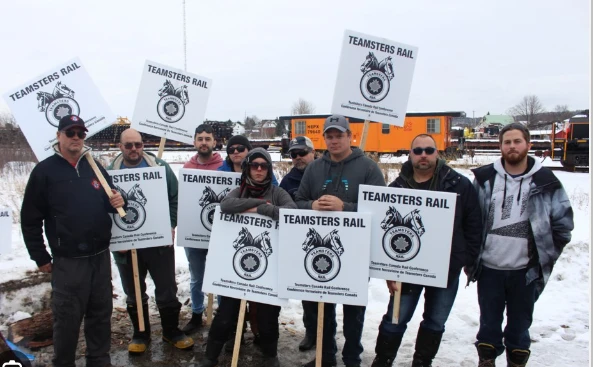Canada rail freight shut down threatens to disrupt economy

Stay tuned with 24 News HD Android App

A labor dispute in Canada threatened to disrupt the North American economy on Thursday after the county's two rail operators shut operations, locking out nearly 10,000 workers.
"Despite months of good faith negotiations ... parties remain far apart, and both CN and CPKC have begun their lockout," the Teamsters Canada Rail Conference union said in a statement, referring to Canadian National Railway (CN) and Canadian Pacific Kansas City (CPKC). The union representing the workers had given a midnight (0500 GMT) deadline to reach a deal.
The disputes have centered around workers' concerns over long hours and fatigue leading to dangerous working conditions. It is the first time Canada has faced simultaneous work stoppages at the two companies, which in the past have negotiated labor deals in alternate years. Canada is the world's second-largest country, and relies heavily on rail transport.
CN and CPKC have tracks that stretch from the Atlantic to the Pacific coasts and south into the United States. They carry an estimated Can$1 billion (US$730 million) worth of goods daily, including grains and potash, cars and petroleum products, and timber.
Business groups and farmers have warned of costly disruptions to the G7 economy. "It really is devastating for the grain industry, because we can't move the product," Wade Sobkowich, head of the Western Grain Elevator Association, told AFP.
"We're completely blocked from moving any new grain as of today," he added. US rail companies and overseas shippers had already stopped accepting some goods destined for Canada in anticipation of a disruption.
The chambers of commerce of the United States and Canada issued a joint statement Tuesday calling on the government of Canadian Prime Minister Justin Trudeau to take action. "A stoppage of rail service will be devastating to Canadian businesses and families and impose significant impacts on the US economy," they said.
"Significant two-way trade and deeply integrated supply chains between Canada and the United States mean that any significant rail disruption will jeopardize the livelihoods of workers across multiple industries on both sides of the border." CN had sought to force the temporary relocation of workers to fill staff shortages in parts of Canada, which the union rejected.
"The union did not respond to another offer by CN in a final attempt to avoid a labor disruption," it said in a statement. For its part, CPKC said it had "bargained in good faith, but despite our best efforts, it is clear that a negotiated outcome with the TCRC is not within reach."
The Teamsters leadership "continues to make unrealistic demands," it added. The Teamsters said the two rail operators "have shown themselves willing to compromise rail safety and tear families apart to earn an extra buck," said union president Paul Boucher.
The union said it remained at the "bargaining table" with the two firms despite the lockout. The Anderson Economic Group, which specializes in estimating losses, said that a three-day lockout could cost US$303 million and predicted a US$1 billion loss for a week-long disruption. The analysts said that the United States would largely be spared significant impact as long as the dispute ended within a week. Experience shows that "shippers will aggressively seek alternate routes, and industry will move to substitute other suppliers, especially during the first week of a strike or shutdown," Anderson said.
